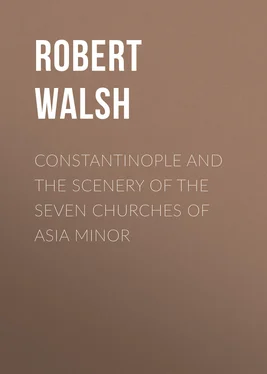Robert Walsh - Constantinople and the Scenery of the Seven Churches of Asia Minor
Здесь есть возможность читать онлайн «Robert Walsh - Constantinople and the Scenery of the Seven Churches of Asia Minor» — ознакомительный отрывок электронной книги совершенно бесплатно, а после прочтения отрывка купить полную версию. В некоторых случаях можно слушать аудио, скачать через торрент в формате fb2 и присутствует краткое содержание. Жанр: foreign_prose, foreign_home, История, foreign_antique, на английском языке. Описание произведения, (предисловие) а так же отзывы посетителей доступны на портале библиотеки ЛибКат.
- Название:Constantinople and the Scenery of the Seven Churches of Asia Minor
- Автор:
- Жанр:
- Год:неизвестен
- ISBN:нет данных
- Рейтинг книги:5 / 5. Голосов: 1
-
Избранное:Добавить в избранное
- Отзывы:
-
Ваша оценка:
- 100
- 1
- 2
- 3
- 4
- 5
Constantinople and the Scenery of the Seven Churches of Asia Minor: краткое содержание, описание и аннотация
Предлагаем к чтению аннотацию, описание, краткое содержание или предисловие (зависит от того, что написал сам автор книги «Constantinople and the Scenery of the Seven Churches of Asia Minor»). Если вы не нашли необходимую информацию о книге — напишите в комментариях, мы постараемся отыскать её.
Constantinople and the Scenery of the Seven Churches of Asia Minor — читать онлайн ознакомительный отрывок
Ниже представлен текст книги, разбитый по страницам. Система сохранения места последней прочитанной страницы, позволяет с удобством читать онлайн бесплатно книгу «Constantinople and the Scenery of the Seven Churches of Asia Minor», без необходимости каждый раз заново искать на чём Вы остановились. Поставьте закладку, и сможете в любой момент перейти на страницу, на которой закончили чтение.
Интервал:
Закладка:
The sovereigns of Bythinia and Macedon were the most persevering in their attacks. A siege by the latter is rendered memorable by a circumstance connected with it. Philip sat down before the city, and attempted to take it by surprise. A dark night was selected for the purpose, when it was hoped the citizens could not be prepared to resist the concealed and sudden attack. The moon, however, appeared to emerge from the black sky with more than common brilliancy, and illumined distinctly every object around the city. The obscure assailants were thus unexpectedly exposed to view, and discovered; and the citizens, now upon their guard, easily repulsed them. Grateful for this seasonable and supposed miraculous interference of the goddess, the Byzantines adopted Diana as their tutelar deity, and depicted her under the form of a crescent. By this emblem she is represented on the coins of the city, still extant, with the legend ΒΥΣΑΝΤ ΣΩΤ, implying that she was the “ saviour of Byzantium .” This emblem of the ancient city was adopted by Constantine, when he transferred hither the seat of empire, and it was retained by the Turks, like many other representations, when they took possession of it. The crescent therefore is still its designation, not as a Mohammedan, but a Byzantine emblem.
After many struggles, with more powerful nations, to maintain its independence, Byzantium attracted the attention of the Romans. In the contests of the different competitors for the empire, the possession or alliance of this city was of much importance, not merely on account of its power and opulence, but because it was the great passage from Europe to Asia. It was garrisoned by a strong force, and no less than five hundred vessels were moored in its capacious harbour. When Severus and Niger engaged in hostilities, this city adhered to the latter, many of whose party fled thither, and found a secure asylum behind fortifications which were deemed impregnable. Siege was laid to it by the victorious Severus, but it repelled all his assaults for three years. Its natural strength was increased by the skill of an engineer named Priscus, who, like another Archimedes, defended this second Syracuse by the exercise of his extraordinary mechanical powers. When it did yield, it fell not by force, but famine. Encompassed by the great Roman armies on every side, its supplies ware at length cut off, as the skill of the artist was incapable of alleviating the sufferings of starvation. By the cruel and atrocious policy of the most enlightened ages of the pagan world, the magistrates and soldiers were put to death without mercy, for their gallant defence, to deter others from similar perseverance; and to destroy for ever its power and importance, its privileges were suppressed, its walls demolished, its means of defence taken away; and in this state it continued, an obscure village, subject to its neighbours the Perenthians, till it was unexpectedly selected to become the great capital of the Roman empire, an event rendered deeply interesting because it was connected with the extinction of paganism, and the acknowledgment of Christianity, as the recognised and accredited religion of the civilized world.
The emperor Diocletian, impelled by his cruel colleague Galerius, had consented to the extermination of the Christians, now becoming a numerous and increasing community all over the Roman empire: decrees were issued for this purpose, and so persevering and extreme were the efforts made to effect it, that medals were struck and columns erected with inscriptions, implying that “the superstition of Christianity was utterly extirpated, and the worship of the gods restored.” But while, to all human probability, it was thus destroyed, the hand of Providence was visibly extended for its preservation; and mankind with astonishment saw the sacred flame revive from its ashes, and burn with a more vivid light than ever, and the head of a mighty empire adopt its tenets from a conviction of their truth, when his predecessor had boasted of its extinction on account of its falsehood. This first Christian emperor was Constantine.
Christian writers assert that he, like St. Paul, was converted by a sensible miracle while journeying along a public way. There were at this time six competitors for the Roman empire. Constantine was advancing towards Rome to oppose one of them−Maxentius: buried in deep thought at the almost inextricable difficulties of his situation, surrounded by enemies, he was suddenly roused by the appearance of a bright and shining light; and looking up, he perceived the representation of a brilliant cross in the sky, with a notification, that it was under that symbol he should conquer. Whether this was some atmospheric phenomenon which his vivid imagination converted into such an object, it is unnecessary to inquire. It is certain that the effects were equally beneficial to mankind. He immediately adopted the emblem as the imperial standard, and under it he marched from victory to victory. His last enemy and rival was Licinius, who commanded in the east, and established himself on the remains of Byzantium, as his strongest position: but from this he was driven by Constantine, who was now acknowledged sole emperor of the East.
His first care was to build a city near the centre of his vast empire, which should control, at the same time, the Persian power in the east, and the barbarians on the north, who, from the Danube and the Tanais, were continually making inroads on his subjects. It was with this view that Diocletian had already selected Nicomedia as his residence; but any imitation of that persecutor of Christianity, was revolting to the new and sincere convert to the faith,—so he sought another situation. He at one time had determined on the site of ancient Troy, not only as commanding the entrance of the Hellespont, and so of all the straits which led to the Euxine Sea, but because this was the country of his Roman ancestors, to whom, like Augustus, he was fond of claiming kindred. He was at length induced to adopt the spot on which he had defeated his last enemy, and he was confirmed in his choice by a vision. While examining the situation, he fell asleep; and the genius who presided over mortal slumbers, appeared to him in a dream. She seemed the form of a venerable matron, far advanced in life, and infirm under the pressure of many years and various injuries. Suddenly she assumed the appearance of a young and blooming virgin; and he was so struck with the beautiful transition, that he felt a pride and pleasure in adorning her person with all the ornaments and ensigns of his own imperial power. On awaking from his dream, he thought himself bound to obey what he considered a celestial warning, and forthwith commenced his project. The site chosen had all the advantages which nature could possibly confer upon any single spot. It was shut in from hostile attack, while it was thrown open to every commercial benefit. Almost within sight, and within an easily accessible distance, were Egypt and Africa, with all the riches of the south and west, on the one hand; on the other were Pontus, Persia, and the indolent and luxurious East. The Mediterranean sent up its wealth by the Hellespont, and the Euxine sent hers down by the Bosphorus. The climate was the most bland and temperate to be found on the surface of the globe; the soil, the most fertile in every production of the earth; and the harbour, the most secure and capacious that ever opened its bosom to the navigation of mankind: winding round its promontories, and swelling to its base, it resembled the cornucopia of Amalthea, filled with fruits of different kinds, and was thence called “The Golden Horn.”
His first care was to mark out the boundaries. He advanced on foot with a lance in his hand, heading a solemn procession, ordering its line of march to be carefully noted down as the new limits. The circuit he took so far exceeded expectation, that his attendants ventured to remonstrate with him on the immensity of the circumference. He replied, he would go on till that Being who had ordered his enterprise, and whom he saw walking before him, should think proper to stop. In this perambulation he proceeded round six of the hills on which the modern city is built. Having marked out the area, his next care was to fill it with edifices. On one side of him rose the forests of Mount Hæmus, whose arms ramify to the Euxine and the mouth of the Bosphorus, covered with wood; these gave him an inexhaustible supply of timber, which the current of the strait floated in a few hours into his harbour, and which centuries of use have hardly yet thinned, or at all exhausted. On the other, at no great distance, was Perconessus, an island of marble rising out of the sea, affording that material ready to be conveyed by water also into his harbour, and in such abundance, that it affords at this day, to the present masters of the city, an inexhaustible store, and lends its name to the sea on whose shores it so abounds.
Читать дальшеИнтервал:
Закладка:
Похожие книги на «Constantinople and the Scenery of the Seven Churches of Asia Minor»
Представляем Вашему вниманию похожие книги на «Constantinople and the Scenery of the Seven Churches of Asia Minor» списком для выбора. Мы отобрали схожую по названию и смыслу литературу в надежде предоставить читателям больше вариантов отыскать новые, интересные, ещё непрочитанные произведения.
Обсуждение, отзывы о книге «Constantinople and the Scenery of the Seven Churches of Asia Minor» и просто собственные мнения читателей. Оставьте ваши комментарии, напишите, что Вы думаете о произведении, его смысле или главных героях. Укажите что конкретно понравилось, а что нет, и почему Вы так считаете.












